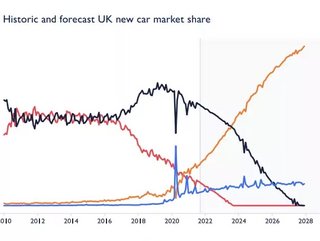Hybrids set to dominate UK car market

Hybrids are set to dominate the UK car market with as much as a 70-80% share by 2027, according to a 'State of the Switch' New Automotive report.
While the report expects developments that move some potential hybrid buyers over to battery electric vehicles (BEVs), notably reductions in BEV purchase prices and policy interventions like a zero emissions vehicle (ZEV) mandate, these figures show how the popularity of hybrids is one of the key issues facing the UK’s switch to electric vehicles.
Currently around 20% of new cars sold in Britain are electric, but the forecasts show only gradual growth to 2028 (light blue line), in contrast to the steep rise of hybrids (orange).
"The popularity of diesel has collapsed, and the petrol share of the market is starting to decline, too," it notes. New petrol and diesel car sales are set to be banned from 2030.
In closing remarks, it notes the shift to EVs is a change that is going to happen, not just because we need it to happen for environmental reasons, but because it involves moving to a better technology than the one being replaced.
"EVs are already cheaper to run and maintain than their internal combustion equivalents, and over the next few years they will become cheaper to manufacture and purchase as well."
McKinsey notes that a few years ago, the main questions customers had when purchasing EVs were about price and driving range; today the primary concern is adequate charging infrastructure.
"To keep pace with the rapidly growing interest in electric vehicles, vast networks of publicly accessible chargers will need to be built and put into operation in short order. A failure to do so could stymie EV growth and slow progress on decarbonising road transport," it notes.
UK breakdown service, the AA, has partnered with ScottishPower to help more UK drivers make a move to electric vehicles by giving people with ‘range anxiety’ confidence to switch to a zero-emissions vehicle.
The new partnership will ensure that if anyone who buys an EV charger from ScottishPower is “out of charge” when driving their electric vehicle, the AA will pick them up and take them to their nearest charge point or home – whichever is closer.
Gavin Franks, Business Services Director at the AA, said: “Supporting drivers is at the heart of everything we do at the AA and this includes giving more power to electric drivers."
The challenges aren't restricted to the UK. HEVO recently launched its EV charging app, Journey, acknowledging that "charge anxiety" makes the EV driving experience exhausting and further hampers the mass adoption of EVs.
"The poor EV charging experience has been well-chronicled," states Jeremy McCool, HEVO founder and ceo. "Journey is the simple solution to charge anxiety. From the convenience of their phone, it allows drivers to plan and control their EV charging experience across multiple charging networks."
The global electric car market is projected to reach US$476,730 million by 2027, from US$97,260 Million in 2020, at a CAGR of 25.3% during 2021-2027.
The expansion of the electric car market is aided by factors such as rising demand for fuel-efficient, high-performance, low-emission vehicles, reduced need for servicing as well as strict government emission restrictions and regulations.
Zeelo launches Ocado electric employee commute service
Zeelo provides smart bus services for 110 companies and schools globally, transporting 5,000 people per day, saving over 7,000 tonnes of CO2 annually. They aim to transition all of their services into fully electric programmes by 2030.
The electric vehicle programme provides a full 360-degree analysis of the possibilities of businesses providing a fully electric commuting service, including site surveying, charging infrastructure options, routing analysis and vehicle suitability.
The new service, which launched at the end of November, transports employees to and from Ocado Group and its retail head office locations in Hatfield, UK, from nearby towns including St Albans and Welwyn Garden City.
Mark Potter, head of building services at Ocado Group said: "Ocado is committed to being the UK's most sustainable grocer. This starts at our head office where we encourage employees to swap their car for a sustainable alternative. The introduction of the electric bus service with Zeelo allows our employees to benefit from a net zero commuting option
Sam Ryan, ceo of Zeelo, said "We're delighted to be partnering with Ocado and introducing our first electric service to the UK market. This is the start of a decade long journey for us in our goal to operate a fully electric fleet by 2030. Ocado is the perfect partner for our first deployment as we share the same tremendous passion for sustainability."






